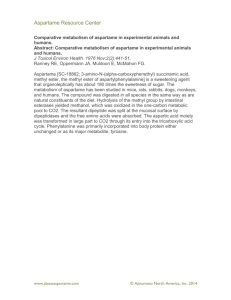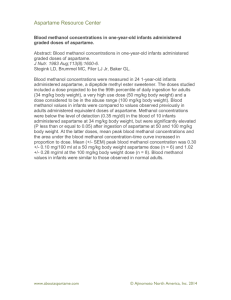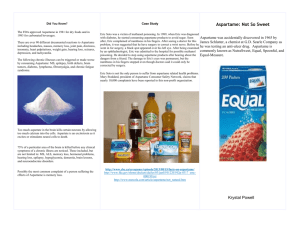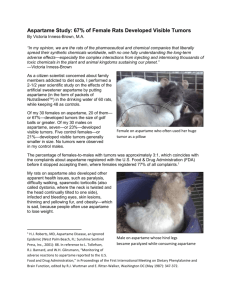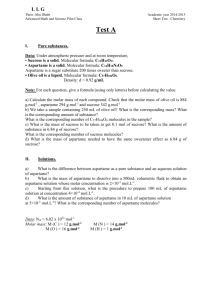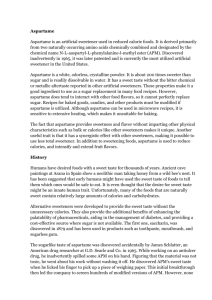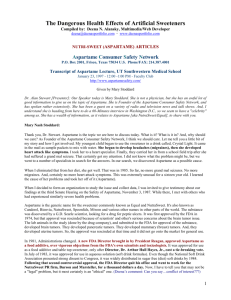Aspartame Resource Center Aspartame, Weight Management and
advertisement
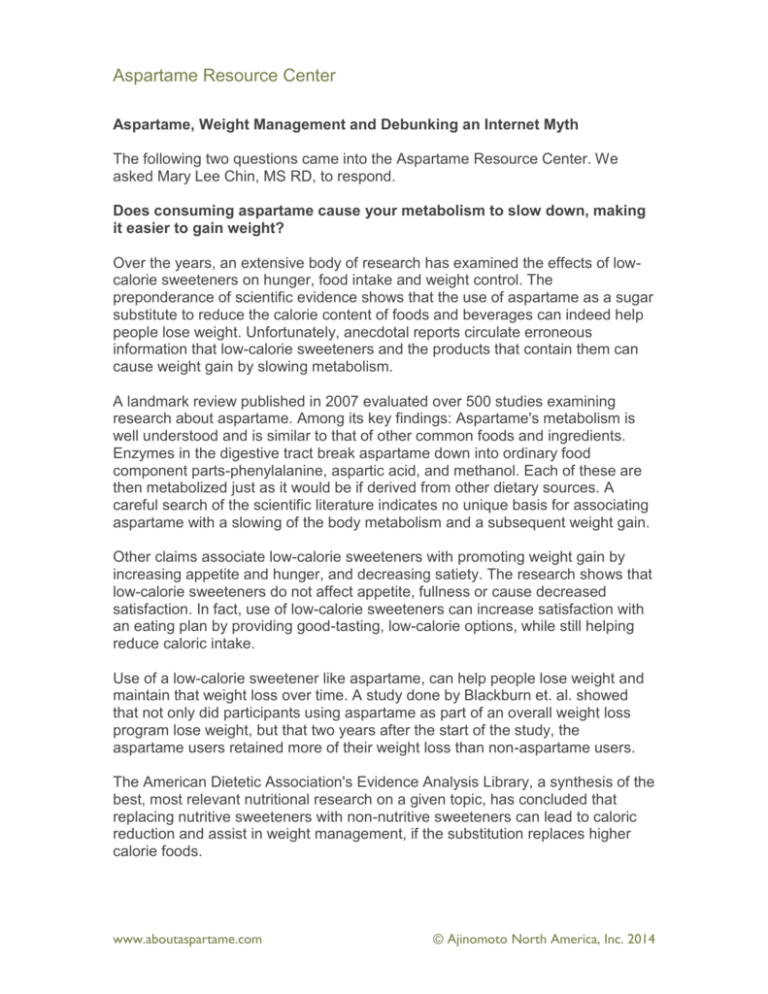
Aspartame Resource Center Aspartame, Weight Management and Debunking an Internet Myth The following two questions came into the Aspartame Resource Center. We asked Mary Lee Chin, MS RD, to respond. Does consuming aspartame cause your metabolism to slow down, making it easier to gain weight? Over the years, an extensive body of research has examined the effects of lowcalorie sweeteners on hunger, food intake and weight control. The preponderance of scientific evidence shows that the use of aspartame as a sugar substitute to reduce the calorie content of foods and beverages can indeed help people lose weight. Unfortunately, anecdotal reports circulate erroneous information that low-calorie sweeteners and the products that contain them can cause weight gain by slowing metabolism. A landmark review published in 2007 evaluated over 500 studies examining research about aspartame. Among its key findings: Aspartame's metabolism is well understood and is similar to that of other common foods and ingredients. Enzymes in the digestive tract break aspartame down into ordinary food component parts-phenylalanine, aspartic acid, and methanol. Each of these are then metabolized just as it would be if derived from other dietary sources. A careful search of the scientific literature indicates no unique basis for associating aspartame with a slowing of the body metabolism and a subsequent weight gain. Other claims associate low-calorie sweeteners with promoting weight gain by increasing appetite and hunger, and decreasing satiety. The research shows that low-calorie sweeteners do not affect appetite, fullness or cause decreased satisfaction. In fact, use of low-calorie sweeteners can increase satisfaction with an eating plan by providing good-tasting, low-calorie options, while still helping reduce caloric intake. Use of a low-calorie sweetener like aspartame, can help people lose weight and maintain that weight loss over time. A study done by Blackburn et. al. showed that not only did participants using aspartame as part of an overall weight loss program lose weight, but that two years after the start of the study, the aspartame users retained more of their weight loss than non-aspartame users. The American Dietetic Association's Evidence Analysis Library, a synthesis of the best, most relevant nutritional research on a given topic, has concluded that replacing nutritive sweeteners with non-nutritive sweeteners can lead to caloric reduction and assist in weight management, if the substitution replaces higher calorie foods. www.aboutaspartame.com © Ajinomoto North America, Inc. 2014 Aspartame Resource Center Numerous valid studies point to the beneficial role that low calorie sweeteners, including aspartame, plays as an effective weight management tool. Research demonstrates that using food and drinks sweetened with aspartame in a reduced calorie diet, and together with regular physical activity, can help reduce body weight and maintain weight control. I read on the internet that aspartame is harmful because it turns into formaldehyde - how can that be? Upon digestion, aspartame breaks down to three common dietary components, the amino acids, aspartic acid and phenylalanine, and methanol, which are then absorbed into the blood. Aspartic acid and phenylalanine are building blocks of protein and are found naturally in all protein-containing foods, including meats, grains and dairy products. These components are used in the body in exactly the same ways as when they are derived in much greater amounts from common foods and beverages. For example, a serving of non-fat milk provides about 6 times more phenylalanine and 13 times more aspartic acid than the same amount of beverage sweetened with aspartame. Methanol, the third component of aspartame digestion, is rapidly converted to CO2 and H2O with formaldehyde and formate as an intermediary in the body. About 10 percent by weight of aspartame is released as methanol. Methanol is also found naturally, and in greater quantity, in many foods such as fruits and vegetables and their juices. A serving of tomato juice provides more than 3 times more methanol than the same amount of aspartame-sweetened beverage. Because formate can cause metabolic acidosis, methanol is toxic when humans consume it in large quantities. However, in order for the body to accumulate a significant amount of formate a human must consume 200 to 500 mg of methanol per kg of body weight. Put into perspective that amount corresponds to drinking 600 to 1700 cans of diet soft drink at once. Researchers have studied whether methanol levels in the blood rise significantly when humans consume aspartame. In one study, subjects were given 34 mgaspartame/kg body weight. Blood methanol levels did not rise detectably. In another experiment blood methanol levels did not rise even when subjects consumed 200 mg-aspartame/kg body weight. Aspartame, like many fruits and vegetables, breaks down to form harmless amounts of methanol. In long term studies, researchers found that when humans consume aspartame, the resulting low formate production is balanced by excretion, so that blood formate levels do not change. Further research shows that neither aspartame nor its components accumulates in the body over time. Another indication that humans can safely consume products sweetened with aspartame is that it contains less methanol than common natural food www.aboutaspartame.com © Ajinomoto North America, Inc. 2014 Aspartame Resource Center substances. For example, fruit juices contain an average of 140 mg-methanol/L, but an aspartame-sweetened diet soft drink contains only 56 mg-methanol. The graph compares the amount of methanol contained in one serving of aspartame sweetened beverage with a comparable amount of fruit and juice. Thorough research shows that absorption and metabolism of aspartame constituents are the same whether derived from aspartame or other food products. The methanol in aspartame poses no risk to humans. Mary Lee Chin, Denver, CO, is a registered dietitian and provides expert counsel to the Aspartame Resource Center. www.aboutaspartame.com © Ajinomoto North America, Inc. 2014
